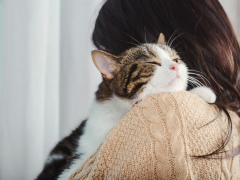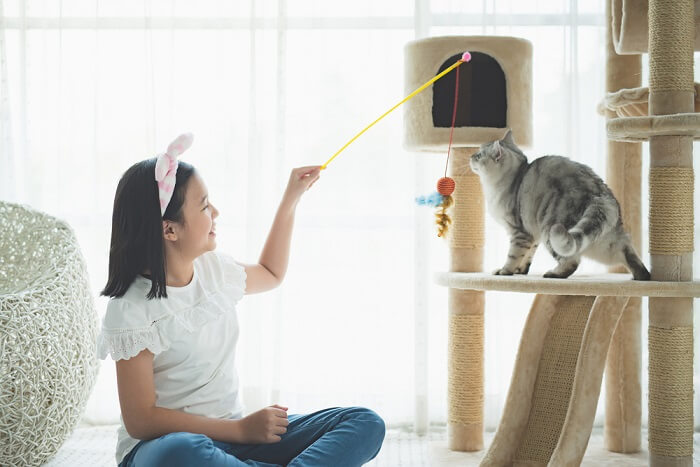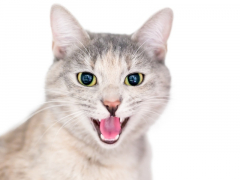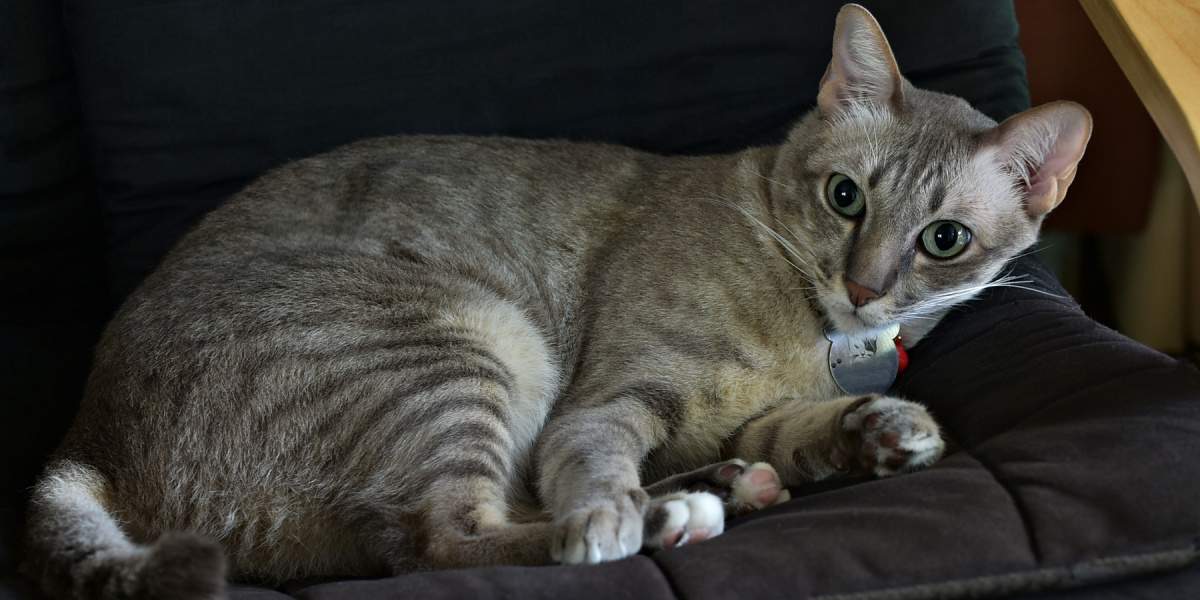
Melatonin is a hormone that may be supplemented for cats, especially to help with sleep problems and behavioral disorders. In this article, you’ll learn what melatonin is, some indications it may have for cats, side effects to be aware of, and some frequently asked questions.
Melatonin for Cats Overview

About Melatonin for Cats
Melatonin is a hormone that is naturally produced by the body in response to darkness. When melatonin is released, it provides a relaxing effect and helps the body get ready for sleep.
Because of its sleep-inducing qualities, melatonin has been used in pets for a long time as a supplement to help with disorders of the sleep-wake cycle. It can also be useful for other behavioral problems where inducing a feeling of calm sleepiness is desired.
As a hormone, melatonin has been found to have an effect on sex hormones and fertility. This attribute may be of benefit for cats used for breeding to help control female cat heat cycles.
Day/night cycles and changes in the photoperiod (daylight length) during the year can affect hair coat growth. While more common in dogs, melatonin may also be used to treat cats that develop seasonal hair loss (alopecia) or other forms of hair loss that cannot be explained by allergy or a skin infection.
Also Read: Common Skin Problems in Cats: Causes and Treatments
There is no FDA-approved form of melatonin that is used for cats. Melatonin is widely available as an oral supplement that is produced by multiple companies in several dosage amounts.
Melatonin also comes in the form of an implant that goes under the skin. The most common brand that is marketed to animals including cats, is Dermatonin.
Dose for Cats
There is no labeled dose of melatonin for cats. Dosing has been based on clinical experience and limited studies. Because there is a wide range, check with your veterinarian for the best place to start with dosing for your cat.
Sleep Disorders
Doses range from 1.5–6mg prior to bedtime. Doses as high as 12mg every 12 hours have been prescribed.
Similar dosing may be used for other behavioral concerns where a sense of calm is desired. Melatonin has not been shown to be as successful for stressful events as other medications like gabapentin. However, doses similar to those used prior to bedtime for sleep disorders have been used.
For Suppression of Estrus/Heat in Female Cats
For suppression of estrus/heat in cats, doses of anywhere from 4–30mg per day have been used. An 18mg subcutaneous (under the skin) implant has also been used, which suppressed estrus for 2–4 months.
A high degree of variability has been found in the use of melatonin for breeding control in cats. It is best to consult with a veterinary reproductive specialist/theriogenologist before undertaking any serious hormone therapy for breeding cats.
How To Administer Melatonin to Cats
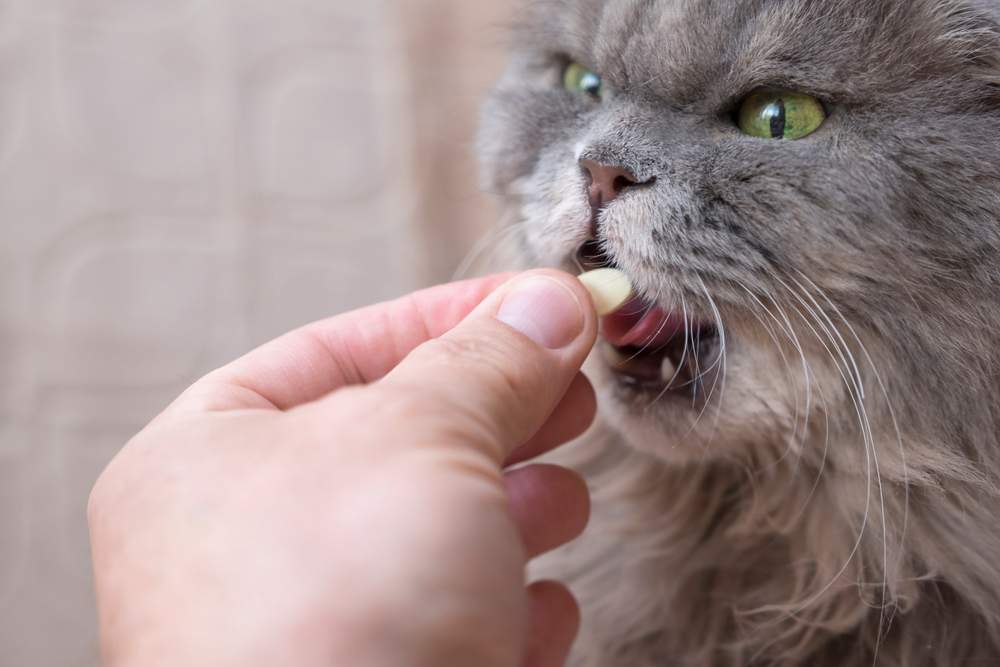
Oral forms of melatonin supplements available over the counter come in many different forms, including tablets, capsules, chewables, oral solutions, and gummies. Many pet health supplement companies also have chews or treats developed for pets.
Melatonin can be given with or without food. It can be helpful to initially hide pills in a cat treat or some canned food. If your cat will not take a capsule or pill or doesn’t find a chewable very tasty, you may have to pill your cat by mouth.
There is a subcutaneous implant, like the brand Dermatonin, that goes under the skin. This may be an option for cats who won’t take oral medication at all. This may be a preferred route for cats used for breeding or for hair growth disorders responsive to melatonin.
If you don’t have experience giving your cat injections, it is best to consult with your vet before using this form of melatonin. Further instruction or training may be needed, or it may be best for your veterinarian to oversee the injection of the implant.
Side Effects of Melatonin for Cats
Melatonin is considered very safe for use in cats. As a natural hormone the body already produces, adverse events are considered rare.
Sedation in the form of sleepiness is very common to see. This effect is often why melatonin is used and so may be expected and desired.
When used for hair growth disorders, breeding, or other cases where we don’t want to see a sleepy cat, a dose of oral melatonin can be easily adjusted. There are many different doses available.
Melatonin should be monitored carefully in cats used for breeding, as it can disrupt fertility cycles and affect pregnancy. This may be desired to help with controlled breeding, but if used for behavior or another purpose in a breeding queen or tom, it is important to be mindful of its potential impact on sex hormones.
Overdose and Emergencies
There is little clinical evidence for overdoses of melatonin in pets. Higher doses may make a cat more tired, but it is very unlikely that a dose exceeding what is recommended will have a significant impact on health.
There is a lot of variability in melatonin products that are available. So it’s important to stop product administration and contact one of the following immediately if you have concerns about seeing side effects after giving your cat a dose of melatonin:
- Your veterinarian
- ASPCA Animal Poison Control Center (1-888-426-4435)
- Pet Poison Helpline (1-855-764-7661)
Potential Drug Interactions With Melatonin
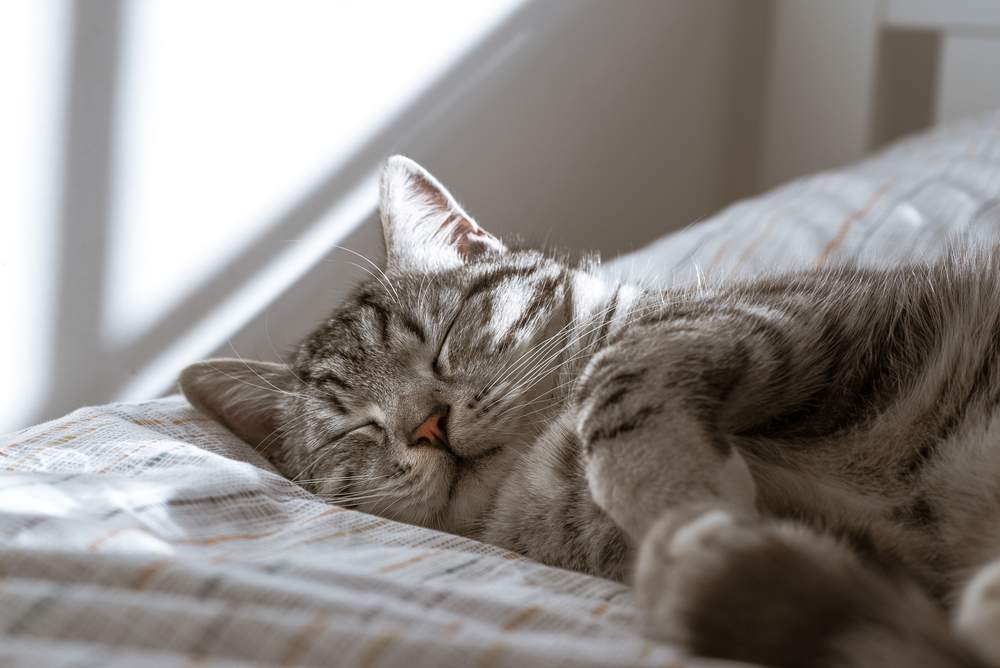
There are a couple of medications that may have interactions with melatonin.
With the exception of benzodiazepines, which may be used in some cats for sedation, anxiety, or seizure management—use of the other medications in this list is either rare in cats or not recommended.
This does not mean benzodiazepines and melatonin cannot be used together. Use should be considered in light of risks of potential side effects versus potential benefits.
- Benzodiazepines (Valium, Xanax): Use together with melatonin may increase sedative effects.
- Cimetidine (Tagamet): Rarely used in cats.
- Succinylcholine: Rarely used in cats
- Warfarin: Not recommended for use in cats.
Always discuss starting any new medications or supplements with your veterinarian to see how they may interact with other medications your cat is currently taking.
How To Store Melatonin
Generally, melatonin should be stored at room temperature in air-tight containers. Because there are many melatonin products available, check individual products for storage guidelines.
Drug Dosing Disclaimer: We are only able to provide doses for medications that are FDA approved for use in cats and only as the label guidelines dictate. For medications that are used off-label we can only provide guidelines and safety information for use. Safe and appropriate dosing for off-label medications can only be determined by a primary care veterinarian.
We encourage you to work with your veterinarian to determine if a particular medication is appropriate for your cat. Changing or adjusting a dose for your cat on your own without consulting with a veterinarian can carry risk. We do not encourage use of medications prescribed for human use in pets without first consulting with a primary care veterinarian.
Frequently Asked Questions
Is Melatonin Safe for Cats?
Melatonin is generally very safe for cats. As a natural sleep hormone produced by the body, side effects other than inducing a state of sleep or light sedation is very rare.
What if I Miss a Dose of Melatonin?
Melatonin is generally very safe and overdoses are rare. It works within the body for 12-24 hours and many pets receive it only once a day. If you miss a dose, there is little risk in giving another sooner within that 12-24 hours period. There is likely no added benefit however, to giving melatonin more often than every 8 hours.
How Long Can Cats Take Melatonin?
Long-term use studies are lacking, but as a natural sleep hormone, no long-term use concerns have been raised either. In many cases with sleep or hair growth disorders, benefits of melatonin are likely seen because of a deficiency. Supplementing long-term in these cases is simply replenishing what the body needs.
What Time of Day Should Cats Take Melatonin?
When used for helping with night time behavior disorders and to help regulate sleep cycles, melatonin is best given an hour or so prior to bedtime.
When used as part of a protocol to relieve fear or stress caused by specific events, melatonin is generally given at least 2 hours prior to the event.
Melatonin may be used morning and evening if used as part of a protocol for generalized behavior disorders.
Can I Give My Cat OTC Melatonin?
Yes, in fact over the counter melatonin found at a human pharmacy or pharmacy department is the most common variety that is used. Because over the counter supplement products are not subject to the same regulations and restrictions as prescription medications, it is important to look for products of good quality. Looking for the USP Verified Mark is one way to feel comfortable about the quality of any human supplement product you use for a pet.
If you have questions about a melatonin product or dose, make sure to check with your vet prior to giving it to your cat.
-
Dermatonin. Drugs.com. Accessed August 3, 2023.
-
https://www.drugs.com/vet/dermatonin.html
-
Gollakner, R. Melatonin. VCA Animal Hospitals. Accessed August 3, 2023.
-
https://vcahospitals.com/know-your-pet/melatonin
-
Plumb DC. Melatonin. In: Plumb DC, ed. Plumb's Veterinary Drug Handbook. 9th ed
-
Ruviaro Tuleski GL, Silveira MF, Bastos RF, Pscheidt MJGR, Prieto W da S, Sousa MG. Behavioral and cardiovascular effects of a single dose of gabapentin or melatonin in cats: a randomized, double-blind, placebo-controlled trial. Journal of Feline Medicine and Surgery. 2022;24(12):e524-e534. doi:10.1177/1098612X221124359
-
Schäfer-Somi S. Effect of melatonin on the reproductive cycle in female cats: a review of clinical experiences and previous studies. Journal of Feline Medicine and Surgery. 2017;19(1):5-12. doi:10.1177/1098612X15610369




